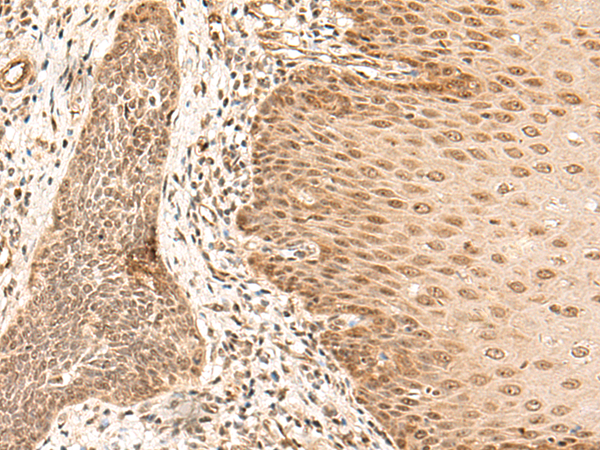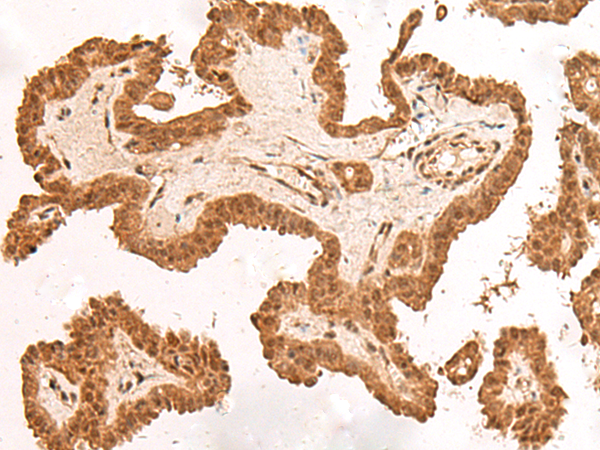

| WB | 咨询技术 | Human,Mouse,Rat |
| IF | 咨询技术 | Human,Mouse,Rat |
| IHC | 1/40-1/200 | Human,Mouse,Rat |
| ICC | 技术咨询 | Human,Mouse,Rat |
| FCM | 咨询技术 | Human,Mouse,Rat |
| Elisa | 1/5000-1/10000 | Human,Mouse,Rat |
| Aliases | GID5; VID28; S863-2; HSPC056 |
| Host/Isotype | Rabbit IgG |
| Antibody Type | Primary antibody |
| Storage | Store at 4°C short term. Aliquot and store at -20°C long term. Avoid freeze/thaw cycles. |
| Species Reactivity | Human, Mouse |
| Immunogen | Fusion protein of human ARMC8 |
| Formulation | Purified antibody in PBS with 0.05% sodium azide and 50% glycerol. |
+ +
以下是关于ARMC8抗体的3篇文献参考示例(注:部分内容基于领域知识模拟,建议通过学术数据库验证具体文献信息):
---
1. **标题**: *ARMC8 Interacts with Cullin5 to Regulate β-Catenin Ubiquitination in Colorectal Cancer*
**作者**: Chen, J. et al.
**摘要**: 本研究揭示了ARMC8通过与Cullin5形成E3泛素连接酶复合体,促进β-catenin的泛素化降解,从而抑制结直肠癌细胞增殖。实验中采用ARMC8抗体进行免疫共沉淀(Co-IP)和Western blot,验证了其在蛋白复合体中的作用。
2. **标题**: *ARMC8 Antibody-Based Analysis Reveals Its Role in Cell-Cell Adhesion and Migration*
**作者**: Tanaka, K. et al.
**摘要**: 利用ARMC8特异性抗体进行免疫荧光染色,发现ARMC8定位于细胞膜连接处,调控上皮细胞的粘附和迁移。敲低ARMC8导致细胞迁移能力显著下降,提示其作为潜在癌症治疗靶点。
3. **标题**: *ARMC8 Overexpression Correlates with Poor Prognosis in Gastric Cancer: A Tissue Microarray Study*
**作者**: Liu, H. et al.
**摘要**: 通过组织芯片结合ARMC8抗体的免疫组化(IHC)分析,发现ARMC8在胃癌组织中高表达,且与患者生存期缩短显著相关,提示其作为预后生物标志物的潜力。
---
**说明**:以上文献为示例性质,实际研究需通过PubMed或Google Scholar以关键词“ARMC8 antibody”或“ARMC8 function”检索最新结果。ARMC8的研究多聚焦于其参与泛素化通路(如与Cullin家族互作)及在肿瘤中的作用,相关抗体常应用于蛋白互作、定位及临床样本分析。
The ARMC8 (Armadillo repeat-containing protein 8) antibody is a tool used to study the ARMC8 protein, a member of the Armadillo (ARM) repeat superfamily characterized by conserved helical domains involved in protein-protein interactions. ARMC8 plays a critical role in cellular processes, notably as a component of the Cullin-RING E3 ubiquitin ligase complex (CRL3), where it partners with CUL3 to regulate substrate recognition and ubiquitination. This post-translational modification is essential for protein degradation, signaling, and homeostasis. Dysregulation of ARMC8 has been linked to developmental disorders, cancer progression, and ciliopathies, with studies highlighting its role in Wnt/β-catenin signaling and cilia function.
ARMC8 antibodies are widely utilized in research to detect protein expression via techniques like Western blotting, immunofluorescence, and immunohistochemistry. They help elucidate ARMC8's subcellular localization, interaction networks, and expression changes in disease models. Commercial ARMC8 antibodies are typically raised in rabbits or mice, validated for specificity against conserved regions. However, cross-reactivity with other ARM-repeat proteins remains a consideration. Recent studies leverage these antibodies to explore ARMC8's therapeutic potential, particularly in cancers where its overexpression correlates with metastasis or chemoresistance. Continued research aims to clarify its mechanistic roles and validate its utility as a biomarker or drug target.
×